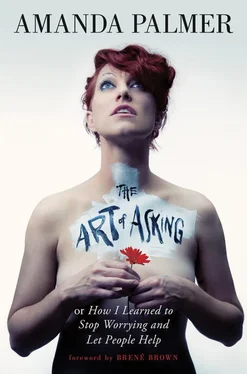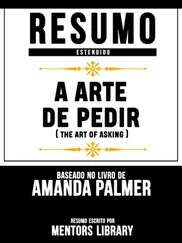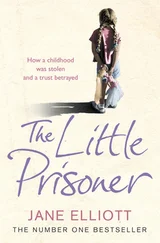Anthony was raised in Boston in a big Italian-American family who’d made their fortune in the liquor and real estate businesses. The combination of his calm, Buddhist approach to life (he taught and introduced me to yoga, meditation, and the general concept of mindfulness), and the fact that he was a martial arts expert, would arm me with pepper spray before I went on long trips alone, and displayed an arsenal of exotic self-defense weapons in the study above the office where he saw his patients, never struck me as strange.
In my Hollywood biopic, he’d be Mr. Miyagi from The Karate Kid , but played by Robert De Niro. In an overdramatic teenage flashback scene, I would confide in him that I’d been sexually assaulted by a boy from the high school. He would then narrow his eyes, make an Italian gesture in which he bit his folded tongue in half while wrinkling his nose, and say:
I’m going to find that guy and beat him to a pulp…
Then he’d put his hands in yoga prayer position over his heart, bow his head, and calmly add:
…with compassion .
We shared our stories on the phone, in long letters sometimes typewritten, sometimes handwritten, and eventually (once it existed) over email. Whenever we could, we connected in person, on long walks, over food, over coffee.
We made up absurd, fictional skits and scenarios about my lovers, our friends, our neighbors, ourselves. One of the skits starred a particularly skinny boyfriend of mine (who had a real-life penchant for wearing skirts) hitchhiking a ride on an eighteen-wheel truck to visit me in college and getting forcibly ejected from the passenger seat when the truck driver realizes he isn’t a girl, then being blown into the air by the blast of tailpipe exhaust as the truck pulls away, then magically being picked up by a passing breeze for a few hundred miles and floating through the metal grate above my basement dorm window, into the room, and onto my bed. We would tack on details of these skits over dozens of phone calls, making up absurd new characters, cracking each other up. We were ridiculous.
But as I got older, we shared more of the real things. Not just the entertaining stories, but the sad ones. The mean ones. The embarrassing ones. The scary ones. He told me his whole life, and I told him mine. Our love ran deep.
Anthony was also one of my patrons. He gifted me books on Buddhism and pocket knives. Occasionally, when he knew I was broke, he’d include a crisp hundred-dollar bill in a letter. When I was just out of college, surviving from statue paycheck to stripper paycheck, making my living in one-dollar bills, Anthony would sometimes front my rent money if I was tight on cash. I was once wiped out by a three-hundred-dollar speeding ticket I got on the Massachusetts Turnpike while racing to a gig as an artist’s model at a local art college. I had $250 in my bank account and my $350 rent was due. I borrowed the money from Anthony.
I swear I’ll pay you back , I promised.
I know you will , he answered. I would.
We used to talk about what would happen if he died. He’s more than twenty-five years older than me, and I worried about it. I once asked him, while we were lying on the adjacent couches of his study, what I should say at his funeral. Since I’d probably have to say something.
He gave this some thought. He said he’d like me to walk up to the front of the wake or memorial or whatever, carrying a stick.
What kind of stick?
Whatever kind of stick , he said. You know, a branch, a stick. A big one. One you can hold and everyone can see .
So you mean, like, a NATURAL stick. Not like… a martial arts stick. You mean like a…
WHATEVER kind of stick , he said, sounding annoyed. A stick from a tree. An ALL-PURPOSE stick. I’m trying to tell you something important here, clown .
Okay , I said, breathing out. You’re dead, I’m at the funeral. What do I do with the stick?
Don’t say anything , he told me. Just hold that sucker up in the air, break it in half, and throw it on the floor .
Everything breaks.
• • •
I had a hard time keeping boyfriends. They usually lasted about a year, then things would start to get real—or appear to start going in a potentially real direction—and I would flee in terror. But I wasn’t very good at being independent either. I couldn’t stand to spend the night alone and was a serial drunk-dialer of exes.
They all told me I had a fear of intimacy, but I vehemently disagreed; I craved intimacy like a crack addict.
The problem was that I craved intimacy to the same burning degree that I detested commitment.
Being a statue was such a perfect job.
• • •
I loved all the handwritten notes people took the time to write and leave in the hat.
You’re beautiful .
Thank you for changing my day .
I’ve been watching you for an hour .
I love you .
The Bride was so easy to love.
She was silent.
She was blank, harmless, beatific… just loving people and giving them flowers.
She was perfect.
Because… who knew?
She could be anything.
Anyone.
In real life, I was the furthest thing from quiet, and the furthest thing from perfect. I gabbed nonstop, dressed flamboyantly, dyed my hair purple and red and green, repeatedly crashed my bike into cars, started prying conversations with strangers, and hammered on a piano in my bedroom while screeching angry songs about my pain at maximum volume in my spare time.
There was one very sweet-looking guy in his forties or fifties who, for an entire statue summer, gave me a twenty-dollar bill every time he saw me. My peripheral vision was excellent, and I could usually see what size bill people were dropping in my hat—unless they were going out of their way to hide it.
Day after day, I came to recognize him, and even expect him, and eventually we shared a tiny smile every time he passed by. It was a sweet, silent, secret little relationship.
Towards the end of the summer, he kicked around one day until my flowers ran out, and shyly approached me—would I have a cup of coffee with him?
Sure , I said.
I figured I owed it to him. I was impressed he’d even asked.
I went back to the ice-cream shop, changed into my civilian clothes, and we sat together in an outdoor café and chatted about life. He was a chemical engineer, from MIT, and slightly sad. He was nervous, not easy to talk to. I told him about my life: about writing music, about my wonderful crazy art-housemates at the Cloud Club, about living in Germany, what it was like to be a statue. He told me about his failed marriage. Two flawed human beings, sitting at the Au Bon Pain, exchanging mundane details. He’d clearly fallen in a forlorn sort of love with The Bride. Meeting me must have been such a disappointment.
I walked away from our coffee date feeling like I’d broken something beautiful.
I wanted to stay anyone.
It was easier.
• • •
Even if The Bride was slow-moving, it sometimes felt like life happened at light speed; thirty little secret love affairs with passersby in just under seventy minutes, and all the heartache that goes along with it.
I’m in love .
Nobody loves me .
I’m in love .
Nobody loves me .
I’d stand there like a dry plant, passively waiting to be watered.
Any source of nourishment would do. It was so simple, really, like the entirety of the human condition distilled down to a single idea:
Feeling alone. And then, not.
Читать дальше












